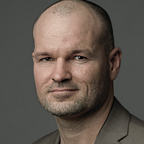Marco Robledo’s “3D Management” — A Book Review
“3D Management — An Integral Theory for Organisations in the Vanguard of Evolution” by Marco A. Robledo
The first thing you need to know is that this is a passionate book, written by a passionate author. And, full disclosure, Marco Robledo is a good friend of mine. We met in integral circles and he is a really sweet guy, very knowledgeable, curious, and generous. In this book, he undertakes the bold task of laying the theoretical foundations of an entirely new way of looking at business and organizations today.
His main source of inspiration is the AQAL integral model by Ken Wilber (who also wrote the foreword), not unlike the influential book by Frederic Laloux, “Reinventing Organizations”, which also draws on integral concepts, especially developmental theory. Both books are similar but also different in important ways. Laloux chooses an inductive, bottom-up approach, by observing what he calls “Teal Organizations” in the wild and extrapolating three breakthroughs of these kinds of organizations from his observations (self-management, wholeness, evolutionary purpose).
Robledo chooses a different angle. His approach is rather deductive compared to Laloux, with the integral model and the four quadrants as a starting point for building a new meta-theoretical foundation for business and theories about business. Yet it is not mere speculation or lofty theorizing. Robledo includes tons of practical examples (also drawing on many companies featured by Laloux) which underline the theoretical points he makes.
Those examples also include a community-run cinema in Mallorca, CineCiutat, which Robledo was practically involved in transforming. This shows that Robledo is not just a professor of management and the director of the MBA at the University of the Balearic Islands, he is also a citizen, who gets down into the nitty-gritty details of actually bringing these kinds of organizations to life for real. One would expect no less degree of embodiment from a truly integral practitioner of 3D Management.
So, let’s look at this peculiar term of “3D Management” and what Robledo wants to convey with it.
The “3D” refers to “The Big Three” of Art, Morals, and Science; or I, We and It; or the Beautiful, the Good, and the True according to Ken Wilber’s integral theory.
These three dimensions are a condensed version of the four quadrants (simplifying the two “exterior” quadrants by treating them as one). The backbone of 3D Management then is to take into account these three fundamental dimensions whenever you are running a business.
“Are the processes of the organization functional and efficient?” is a question pertaining to the objective dimension — Science (“it” and “its”).
“Is the company creating value for the larger community (and future generations)?” is a question that would have to be asked from the intersubjective dimension — Ethics (“we”).
“Is the company enabling creativity and innovation and makes the world more beautiful?” could be a question coming from the subjective dimension — Arts (“I”).
Those dimensions form the 3D Management Triangle. The name “3D” also suggests a higher dimensionality, which is fitting since according to Robledo most organizations are managed in a purely scientific “flatland” manner, devoid of depth and interiors.
Robledo dedicates a chapter to each of the three dimensions in which he explains what the respective dimension means in the context of organizations, provides examples, supporting theories, and uses vivid metaphors for illustration that are fun to read.
To round it off, the three dimensions are anchored in a “Fantastic” fourth dimension, Spirit. Spirit, as the ground of all being, encompasses the objective, subjective and intersubjective dimensions and manifests in companies in the form of purpose and community. Robledo mentions the “For-Purpose Enterprise” model by Encode.org as “a particularly good fit for 3D management”. It builds on the practice of Holacracy in the container of the “Organization” (work matters) and then adds containers for the “Association” (people matters) and the “Company” (legal matters) — all tied together by clear and explicit agreements.
To summarize, “3D Management” is a compelling case for more integral ways of organizing and doing business that take into account all Quadrants (the dimensions), all Levels (of development), all Lines (of development), all States (of consciousness) and all Types (of orientation, e.g., masculine-feminine).
Robledo’s work provides a theoretical meta-framework, capable of believably interweaving multiple theories about business at the vanguard of evolution.
He discusses the most prominent approaches in the field, honors their contributions as well as criticizes them, where it seems necessary. His grand integral map is not just an elegant theory pleasing readers with academic inclinations, it also helps to guide business leaders and practitioners in asking and answering the most important questions with regard to their practical endeavors.
By openly talking about things like Spirit, purpose, wholeness, Art, and Ethics, Marco Robledo dares to stick out his neck and risks to stand outside the academic and business mainstream in a daring move that calls us, the readers, to also take a step and move beyond our comfort zones.
May this book be a match that lights a fire in the hearts of fellow business pioneers yearning to get rid of bullshit jobs to live lives that truly matter and help to bring more wholeness into our lives.
